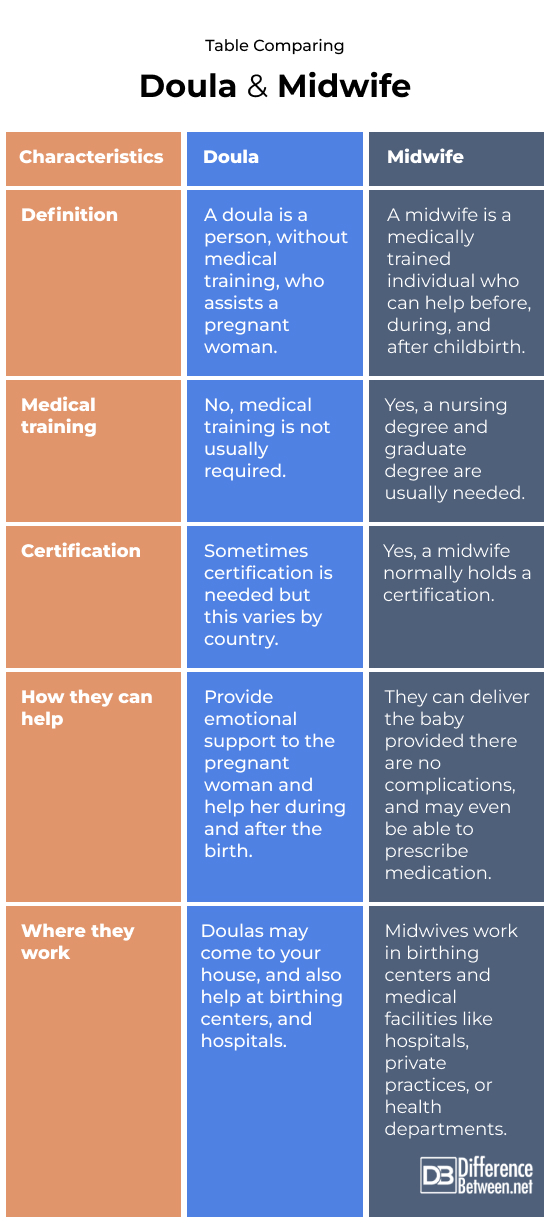Difference Between Doula and Midwife
A doula is someone who helps a woman during her pregnancy and childbirth by providing support in the form of emotional support, information, and guidance. A midwife is a person who has been medically trained to assist a woman during pregnancy and birth. While a midwife can be used instead of a doctor when a baby is being born, this is not the case with a doula. A doula does not have the required medical training, which means a midwife or doctor does need to assist during childbirth. However, a doula can still play a valuable part when a woman gives birth. Since midwives are trained in medicine, they can deliver a baby and provide some other medical services normally done by a doctor.
In short, a doula is an individual who can help provide advice and emotional comfort during pregnancy, childbirth, and after birth. A midwife is a medically trained professional who can deliver babies.

What is a Doula?
Definition:
A doula is a person who does not have medical training but who still assists a woman with her pregnancy and helps her during the labor process. A doula can also give advice on exercise and diet during and after pregnancy. Another way a doula can help is to offer advice on breathing during labor. They can also help massage you, get you to feel more relaxed, and help you position yourself. Doulas may also help for a short while after birth with advice on breastfeeding.
Qualifications:
Doulas are not always certified, as this is not a requirement in some countries like Canada and the United States. However, there are courses and training options for doulas that are available, so some people may still opt to receive some training. Doulas have been shown to benefit women during the birth process. Often, the woman needs less pain medication and finds the process easier by having support from a doula.

What is a Midwife?
Definition:
A midwife is someone with medical training who helps women with pregnancy, birth, and post-natal care. An advantage of a midwife is that they can prescribe medicine and can actually help you deliver your baby. The use of midwives in pregnancy also seems to help reduce the need for a cesarean section, although this may still be required in an emergency if there are complications.
Qualifications:
Midwives often complete a bachelor’s degree in nursing and become registered nurses. They then complete a graduate degree focusing on midwifery. The normally do need to be certified to practice legally as a midwife. The Canadian Midwifery Registration Examination (CMRE) is one example of a certification people can get to officially become licensed midwives. The qualifications are necessary so that midwives are able to perform certain medical procedures and also, to be able to prescribe medications.
Difference between Doula and Midwife?
Definition
A doula is a person, without medical training, who assists a pregnant woman. A midwife is a medically trained individual who can help before, during, and after childbirth.
Medical training
A doula does not need medical training in order to help out a pregnant woman. A midwife does need to be trained in medicine and childbirth.
Certification
Sometimes certification is needed to practice as a doula, but this varies by country. Certification is always required to practice as a midwife.
How they can help
Doulas help by providing emotional support to the pregnant woman and help for her during and after the birth. Midwives can deliver the babies and can prescribe medications.
Where they work
Doulas may come to your house, and also help at birthing centers, and hospitals. Midwives also work in birthing centers, and in medical facilities, such as hospitals, private practices, or health departments.
Table comparing Doula and Midwife

Summary of Doula Vs. Midwife
- Doulas and midwives are both of great help to pregnant women, including during the birthing process.
- A doula does not have any medical qualifications.
- A midwife is medically trained and can do more for a woman in terms of helping to deliver a baby.
FAQ
What is the difference between a doula and a midwife in Canada?
In Canada, a doula is not certified but can provide emotional support while a midwife is a medically trained person who can help with pregnancy and birth.
What are the disadvantages of a doula?
They do not have medical training so can only help to a limited extent, and they also cannot actually deliver the baby.
What does a doula actually do?
A doula provides support, both emotional and physical, and can help you with breathing and positioning during labor.
What do midwives think of doulas?
Midwives may not like doulas because they may feel the birthing process is all up to their help and that a doula is not needed.
How much does a doula cost in Canada?
In Canada, a doula costs between $600 and $1000.
Can doulas deliver babies?
No, a doula is not trained to deliver a baby.
Why I stopped being a doula?
Being a doula is very difficult, and it is hard because the doula function is not well—structured, and there aren’t boundaries in place.
Are doulas worth the money?
Doulas are worth it, if you can afford it since they can keep you calm and know when it is time for you to go to the hospital or get hold of the midwife. They also provide much needed emotional support and help with breathing during the labor and delivery.
At what point in pregnancy should you get a doula?
Getting a doula early during pregnancy is better, and some recommend getting a doula at about 20 weeks gestation.
- Difference Between Rumination and Regurgitation - June 13, 2024
- Difference Between Pyelectasis and Hydronephrosis - June 4, 2024
- Difference Between Cellulitis and Erysipelas - June 1, 2024
Search DifferenceBetween.net :
Leave a Response
References :
[0]Corfield, Justin. “doula”. Encyclopedia Britannica, 2024, https://www.britannica.com/topic/doula
[1]Hoxha, Ilir, et al. "Systematic review and meta‐analysis examining the effects of midwife care on cesarean birth." Birth (2023).
[2]National Partnership for Women. "Continuous support for women during childbirth: 2017 cochrane review update key takeaways." The Journal of Perinatal Education 27.4 (2018): 193.
[3]Image credit: https://www.canva.com/photos/MAEGgJGn0v4-pregnant-couple-with-doula-at-home/
[4]Image credit: https://www.canva.com/photos/MAEIymuIMC0-midwife-checking-weight/
